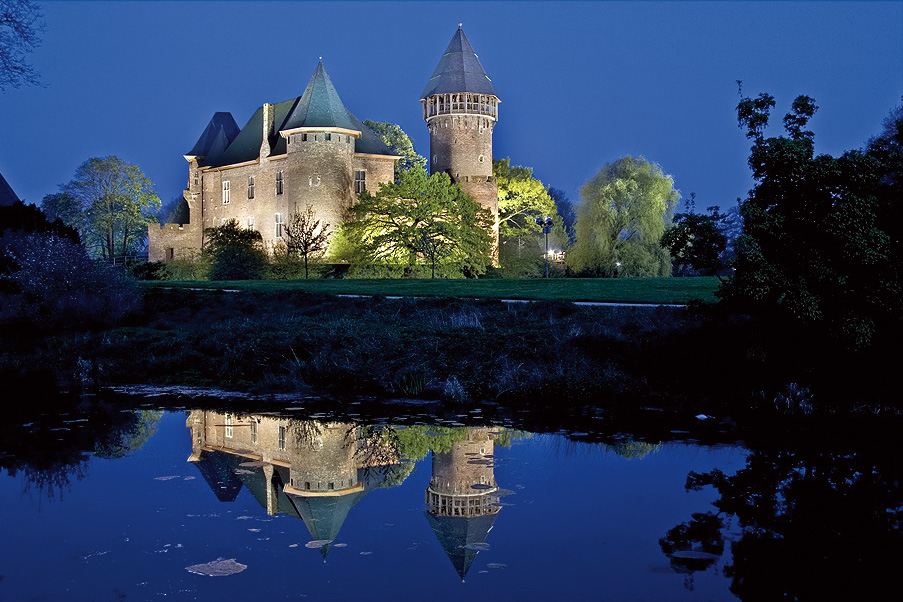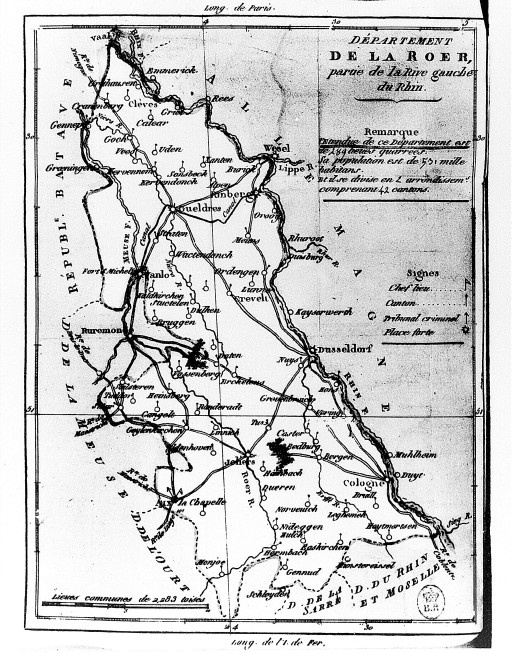|
Thierry Hermès
Thierry Hermès (10 January 1801 – 10 January 1878) was a French businessman who founded Hermès International and acquired the title as a fashion house designer. He was born in 1801 in Krefeld, Germany. Hermès originally established his business as a saddle company in 1837. His first workshop showcased jewelry, home decor items, and silk scarves. His father Thierry Hermès originated from France and his mother, Agnese Kuhnen originated from Germany. He lost his family due to disease and moved to Paris in 1821. After his death in 1878, his son and grandsons Charles-Emile Hermès, Adolphe Hermès and Emile-Maurice, continued to run the family business. Early life Thierry Hermès was born in 1801 in the city of Krefeld, which at the time was part of Napoleon's empire, earning Hermès French citizenship. He was the sixth child of his parents who were innkeepers. After he lost his entire family to disease and war, he moved to France in 1821 as an orphan. Using his gift in leatherwor ... [...More Info...] [...Related Items...] OR: [Wikipedia] [Google] [Baidu] |
Krefeld
Krefeld ( , ; li, Krieëvel ), also spelled Crefeld until 1925 (though the spelling was still being used in British papers throughout the Second World War), is a city in North Rhine-Westphalia, Germany. It is located northwest of Düsseldorf, its center lying just a few kilometers to the west of the river Rhine; the borough of Uerdingen is situated directly on the Rhine. Because of its economic past, Krefeld is often referred to as the "Velvet and Silk City". It is accessed by the autobahns A57 (Cologne– Nijmegen) and A44 (Aachen–Düsseldorf– Dortmund–Kassel). Krefeld's residents now speak ', or standard German, but the native dialect is a Low Franconian variety, sometimes locally called ', ', ', or sometimes simply '. The Uerdingen line isogloss, separating general dialectical areas in Germany and neighboring Germanic-speaking countries, runs through and is named after Krefeld's Uerdingen district, originally an independent municipality. History Early history Records ... [...More Info...] [...Related Items...] OR: [Wikipedia] [Google] [Baidu] |
Coco Chanel
Gabrielle Bonheur "Coco" Chanel ( , ; 19 August 1883 – 10 January 1971) was a French fashion designer and businesswoman. The founder and namesake of the Chanel brand, she was credited in the post-World War I era with popularizing a sporty, casual chic as the feminine standard of style. This replaced the " corseted silhouette" that was dominant beforehand with a style that was simpler, far less time consuming to put on and remove, more comfortable, and less expensive, all without sacrificing elegance. She is the only fashion designer listed on ''Time'' magazine's list of the 100 most influential people of the 20th century. A prolific fashion creator, Chanel extended her influence beyond couture clothing, realizing her aesthetic design in jewellery, handbags, and fragrance. Her signature scent, Chanel No. 5, has become an iconic product, and Chanel herself designed her famed interlocked-CC monogram, which has been in use since the 1920s. Her couture house closed in 1939, with ... [...More Info...] [...Related Items...] OR: [Wikipedia] [Google] [Baidu] |
Businesspeople From Paris
A businessperson, businessman, or businesswoman is an individual who has founded, owns, or holds shares in (including as an angel investor) a private-sector company. A businessperson undertakes activities (commercial or industrial) for the purpose of generating cash flow, sales, and revenue by using a combination of human, financial, intellectual, and physical capital with a view to fueling economic development and growth. History Prehistoric period: Traders Since a "businessman" can mean anyone in industry or commerce, businesspeople have existed as long as industry and commerce have existed. "Commerce" can simply mean "trade", and trade has existed through all of recorded history. The first businesspeople in human history were traders or merchants. Medieval period: Rise of the merchant class Merchants emerged as a "class" in medieval Italy (compare, for example, the Vaishya, the traditional merchant caste in Indian society). Between 1300 and 1500, modern accoun ... [...More Info...] [...Related Items...] OR: [Wikipedia] [Google] [Baidu] |
19th-century French Businesspeople
The 19th (nineteenth) century began on 1 January 1801 ( MDCCCI), and ended on 31 December 1900 ( MCM). The 19th century was the ninth century of the 2nd millennium. The 19th century was characterized by vast social upheaval. Slavery was abolished in much of Europe and the Americas. The First Industrial Revolution, though it began in the late 18th century, expanding beyond its British homeland for the first time during this century, particularly remaking the economies and societies of the Low Countries, the Rhineland, Northern Italy, and the Northeastern United States. A few decades later, the Second Industrial Revolution led to ever more massive urbanization and much higher levels of productivity, profit, and prosperity, a pattern that continued into the 20th century. The Islamic gunpowder empires fell into decline and European imperialism brought much of South Asia, Southeast Asia, and almost all of Africa under colonial rule. It was also marked by the collapse of the la ... [...More Info...] [...Related Items...] OR: [Wikipedia] [Google] [Baidu] |
People From Krefeld
A person ( : people) is a being that has certain capacities or attributes such as reason, morality, consciousness or self-consciousness, and being a part of a culturally established form of social relations such as kinship, ownership of property, or legal responsibility. The defining features of personhood and, consequently, what makes a person count as a person, differ widely among cultures and contexts. In addition to the question of personhood, of what makes a being count as a person to begin with, there are further questions about personal identity and self: both about what makes any particular person that particular person instead of another, and about what makes a person at one time the same person as they were or will be at another time despite any intervening changes. The plural form "people" is often used to refer to an entire nation or ethnic group (as in "a people"), and this was the original meaning of the word; it subsequently acquired its use as a plural form of per ... [...More Info...] [...Related Items...] OR: [Wikipedia] [Google] [Baidu] |
1878 Deaths
Events January–March * January 5 – Russo-Turkish War – Battle of Shipka Pass IV: Russian and Bulgarian forces defeat the Ottoman Empire. * January 9 – Umberto I becomes King of Italy. * January 17 – Battle of Philippopolis: Russian troops defeat the Turks. * January 23 – Benjamin Disraeli orders the British fleet to the Dardanelles. * January 24 – Russian revolutionary Vera Zasulich shoots at Fyodor Trepov, Governor of Saint Petersburg. * January 28 – ''The Yale News'' becomes the first daily college newspaper in the United States. * January 31 – Turkey agrees to an armistice at Adrianople. * February 2 – Greece declares war on the Ottoman Empire. * February 7 – Pope Pius IX dies, after a 31½ year reign (the longest definitely confirmed). * February 8 – The British fleet enters Turkish waters, and anchors off Istanbul; Russia threatens to occupy Istanbul, but does not carry out the threat. * Feb ... [...More Info...] [...Related Items...] OR: [Wikipedia] [Google] [Baidu] |
1801 Births
Eighteen or 18 may refer to: * 18 (number), the natural number following 17 and preceding 19 * one of the years 18 BC, AD 18, 1918, 2018 Film, television and entertainment * ''18'' (film), a 1993 Taiwanese experimental film based on the short story ''God's Dice'' * ''Eighteen'' (film), a 2005 Canadian dramatic feature film * 18 (British Board of Film Classification), a film rating in the United Kingdom, also used in Ireland by the Irish Film Classification Office * 18 (''Dragon Ball''), a character in the ''Dragon Ball'' franchise * "Eighteen", a 2006 episode of the animated television series ''12 oz. Mouse'' Music Albums * ''18'' (Moby album), 2002 * ''18'' (Nana Kitade album), 2005 * '' 18...'', 2009 debut album by G.E.M. Songs * "18" (5 Seconds of Summer song), from their 2014 eponymous debut album * "18" (One Direction song), from their 2014 studio album ''Four'' * "18", by Anarbor from their 2013 studio album '' Burnout'' * "I'm Eighteen", by Alice Cooper common ... [...More Info...] [...Related Items...] OR: [Wikipedia] [Google] [Baidu] |
Jean-Louis Dumas
Jean-Louis Robert Frédéric Dumas (2 February 1938 – 1 May 2010) was a French billionaire businessman who was the chairman of the Hermès group from 1978 to 2006. He was also the company's artistic director. Dumas is credited with turning Hermès into a global luxury brand during his tenure as chairman. Early life and education Jean-Louis Robert Frédéric Dumas was born in Paris, France, on 2 February 1938. He also used the last name Dumas-Hermès. His father was Robert Dumas, and his mother was one of Émile-Maurice Hermès' four daughters. Dumas' grandfather Émile-Maurice Hermès had been a grandson of the company founder Thierry Hermès. Dumas attended the Institut d’Études Politiques de Paris, also dubbed Sciences Po. He also traveled in Iran, Afghanistan, and Nepal in a Citroën 2CV. After travelling in Scandinavia and Czechoslovakia while the drummer of a jazz ensemble, Dumas was sent to Algeria to perform his compulsory military service. Career In 1963, Dumas en ... [...More Info...] [...Related Items...] OR: [Wikipedia] [Google] [Baidu] |
Jane Birkin
Jane Mallory Birkin, Order of British Empire, OBE (born 14 December 1946) is an English-French singer and actress. She attained international fame and notability for her decade-long musical and romantic partnership with Serge Gainsbourg. She also had a prolific career as an actress in British and French cinema. A native of London, Birkin began her career as an actress, appearing in minor roles in Michelangelo Antonioni's ''Blowup'' (1966), and ''Kaleidoscope (1966 film), Kaleidoscope'' (1966). In 1968, she met Serge Gainsbourg while co-starring with him in ''Slogan (film), Slogan'', which marked the beginning of a years-long working and personal relationship. The duo released their debut album ''Jane Birkin/Serge Gainsbourg'' (1969), and Birkin also appeared in the controversial film ''Je t'aime moi non plus (film), Je t'aime moi non plus'' (1976) under Gainsbourg's direction. Birkin would attain further acting credits in the Agatha Christie adaptations ''Death on the Nile (1978 ... [...More Info...] [...Related Items...] OR: [Wikipedia] [Google] [Baidu] |
Grace Kelly
Grace Patricia Kelly (November 12, 1929 – September 14, 1982) was an American actress who, after starring in several significant films in the early to mid-1950s, became Princess of Monaco by marrying Prince Rainier III in April 1956. Kelly was born into a prominent Catholic family in Philadelphia. After graduating from the American Academy of Dramatic Arts in 1949, Kelly began appearing in New York City theatrical productions and television broadcasts. She gained stardom from her performance in John Ford's adventure-romance ''Mogambo'' (1953), for which she was nominated for an Academy Award for Best Supporting Actress. She won the Academy Award for Best Actress for her performance in the drama '' The Country Girl'' (1954). Other notable works include the western '' High Noon'' (1952), the romantic comedy ''High Society'' (1956), and three consecutive Alfred Hitchcock suspense thrillers: ''Dial M for Murder'' (1954), ''Rear Window'' (1954), and ''To Catch a Thief'' (1955). ... [...More Info...] [...Related Items...] OR: [Wikipedia] [Google] [Baidu] |
Krefeld, Germany
Krefeld ( , ; li, Krieëvel ), also spelled Crefeld until 1925 (though the spelling was still being used in British papers throughout the World War II, Second World War), is a city in North Rhine-Westphalia, Germany. It is located northwest of Düsseldorf, its center lying just a few kilometers to the west of the river Rhine; the borough of Uerdingen is situated directly on the Rhine. Because of its economic past, Krefeld is often referred to as the "Velvet and Silk City". It is accessed by the autobahns Bundesautobahn 57, A57 (Cologne–Nijmegen) and Bundesautobahn 44, A44 (Aachen–Düsseldorf–Dortmund–Kassel). Krefeld's residents now speak ', or standard German, but the native dialect is a Low Franconian variety, sometimes locally called ', ', ', or sometimes simply '. The Uerdingen line isogloss, separating general dialectical areas in Germany and neighboring Germanic-speaking countries, runs through and is named after Krefeld's Uerdingen district, originally an independ ... [...More Info...] [...Related Items...] OR: [Wikipedia] [Google] [Baidu] |
Roer (department)
Roer was a department of the French First Republic and later First French Empire in present-day Germany and the Netherlands. It was named after the river Roer (Rur), which flows through the department. It was formed in 1797, when the left bank of the Rhine was occupied by the French. The department was formed from the duchies of Jülich and Cleves, the part of the Archbishopric of Cologne left of the Rhine, the Free City of Aachen, the Prussian part of the duchy of Guelders and some smaller territories. In 1805 the city of Wesel was added to the department. The capital was Aix-la-Chapelle (''Aachen''). The department was subdivided in the following arrondissements and cantons (situation in 1812):Almanach Impérial an bissextil MDCCCXII p. 458-9, accessed in [...More Info...] [...Related Items...] OR: [Wikipedia] [Google] [Baidu] |



_1938.jpg)



